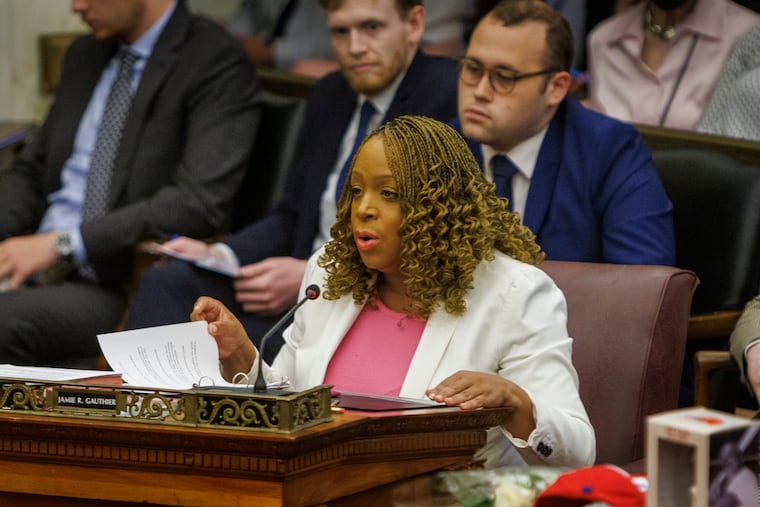City Council could explore reparations for Black Philadelphians
Philadelphia could join a number of other city and state governments that have explored the possibility of reparations for descendants of enslaved Africans.

Philadelphia is poised to study whether it’s able to pay reparations to Black Americans.
City Councilmembers Jamie Gauthier and Kendra Brooks want to create a task force to study the topic, and introduced a resolution Thursday in Council to do so. The task force will be responsible for developing proposals about reparations for Black Philadelphian descendants of enslaved Africans.
“It is crystal clear that many of the crises plaguing our city have their roots in American slavery,” Gauthier said Thursday. “Reparations are not a handout, they’re what the descendants of enslaved Africans are owed and need.”
Gauthier pointed to social failures including predatory housing lenders, employer pay discrimination, and segregated public schools as issues reparations could work to fix.
She also spotlighted the impact of financial disinvestment on Philadelphia’s gun violence crisis.
“You can trace a direct line from the decades of racially motivated disinvestment to Black neighborhoods to gun violence,” Gauthier said. “Until these communities receive the investments required to rectify these problems, gun violence will continue to plague this city.”
Gauthier said the task force “will complete a comprehensive data-driven study to determine if and how our city was complicit in slavery,” and recommend financial and other steps to take.
Brooks, a resolution cosponsor, called the task force “restorative justice.”
City Council is expected to vote on the resolution next week. If it passes, Philadelphia will join a number of other city and state governments that have explored the possibility of reparations.
Once a taboo subject, the idea of governments giving money or other resources to Black descendants of enslaved Africans has garnered support over the years.
The Council resolution comes after a group called the National Coalition of Blacks for Reparations in American, or N’COBRA, held a January rally outside City Hall and called on legislators to create the task force. N’COBRA has been pushing for reparations policies since the 1980s.
Organizers said Thursday they’re ready to get to work.
“This is a participatory process,” said Rashaun Williams, N’COBRA Philadelphia cochair. “It’s imperative that our people make themselves heard and make themselves felt and roll their sleeves up and do the work, because it’s ours.”
N’COBRA has identified five areas injured by slavery that reparations should address: peoplehood, education, health, the criminal justice system, and poverty. The organization believes reparations can come in various forms, including direct payments, land, and economic development.
Williams also wants to temper public expectations. Executing reparations requires city, state, and federal government support, he said.
“Capital and recompense” to Black descendants of enslaved Africans is not something the public should expect from this task force, Williams said.
Locally, independent groups have run their own reparations programs. The Green Street Monthly Meeting of Friends in 2022 pledged $500,000 over 10 years to various issues affecting Black wealth and equity.
And in January, more than 80 interfaith leaders and parishioners in Philly gathered for a four-day workshop about reparations.
A 2014 article by Ta-Nahesi Coates in the Atlantic magazine that attracted national attention made the case for reparations. A 2020 brief published by the Brookings Institute said enslaved people were valued at more than $3 billion in 1860, and the cotton industry alone raked in $250 million the following year. America missed some chances over the years to atone for slavery, authors Rashawn Ray and Andre M. Perry wrote in the Brookings brief, including failing to fulfill Field Order 15, which would have allotted 40 acres of land to each Black family following the Civil War, along with mules to some families.
Later, one of the earliest examples of a government stimulus package, the New Deal, failed to create policy that addressed the impacts of systemic racism.
The program, estimated at about $50 billion at the time, actually widened the racial wealth gap with policies like the G.I. Bill, which gave white soldiers access to free education and home and business loans while excluding Black soldiers.
America today owes Black descendants of the enslaved upward of $14 trillion, according to calculations by William Darity, an economist, and Kirsten Mullen, a historian, both authors of From Here to Equality.
Philadelphia’s move toward a reparations task force comes years after other cities and states have taken on the policy.
Asheville, N.C., in 2020 approved a measure its council called “community reparations,” established a commission, and approved $2.1 million to invest in the project. More than two years later, the initiative has stalled.
Evanston, Ill., established and began executing in 2019 a reparations fund for home repairs, mortgage assistance, and first-time homeownership. As of January, the city had spent $400,000, giving $25,000 each to 16 recipients, while more than 100 people remained on a waiting list. Evanston has committed to contributing $10 million to the fund over 10 years.
California established the nation’s first statewide reparations task force in 2020. In March, economists found California owed upward of $800 billion to Black people in the state. The group’s final report is expected this month, more than two years after research began.
For organizers at N’COBRA, reparations can mean a lot of different things.
“The first thing is honesty,” N’COBRA cochair Williams said in January. “We’re asking for focused activity and positive reparations.”
The group also urged Philadelphia to enforce a 2005 law that requires city-contracted businesses and banks to disclose their historic connections to the institution of slavery and submit proposals on financial initiatives or programs designed to benefit Black people. City spokesperson Sarah Peterson said that the law is being enforced by the city Procurement Department and that city-contracted companies are in compliance.
Breanna Moore, an N’COBRA cochair, said she expects investigation into the 2005 slavery disclosure law and its enforcement to fall under the new task force’s responsibilities.